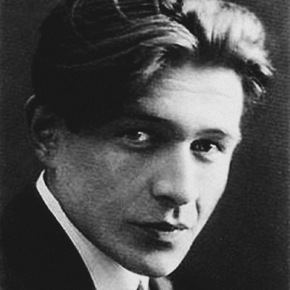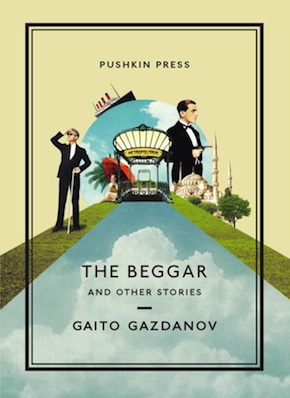Six white robins
by Mika Provata-CarloneThe Beggar and Other Stories is a very unusual collection, and in fact an arrangement not directly intended to appear as such by its author. Its compiler, Gaito Gazdanov’s newest translator Bryan Karetnyk, has orchestrated a truly unconventional array of layers of both fiction and reality, of narrative experiences and of perspectives of vision and existence. So much so, that this slim volume would well deserve to be classified as a curio were it not for the distinct masterfulness of Gazdanov’s imagination and prose, and especially of all that lies behind each word, situation and character.
Gazdanov was himself an atmospheric and enigmatic figure, at least as fictional as any of his characters. With Ossetian roots, he was born in St Petersburg to an Orthodox, Russian-speaking middle-class family, whose peregrinations in Siberia and the Ukraine resulted in a childhood of enchanted solitude and an eccentric sense of cultural and personal belonging. At 13, Gazdanov discovered the wonders and mysteries of Kant, philosophy and the power of words; after joining the White Army as a student during the Russian Revolution, he escaped to Constantinople in 1920, then Bulgaria and finally Paris, which became his home and the backdrop of his stories (always written in Russian) for most of his life. At 50, he left France for Munich, where he worked until his death for Radio Liberty under the alias of Georgij Tscherkassow, to protect family members still in the Soviet Union.
An idiosyncratic, almost postmodern permutation of the Renaissance man, Gazdanov studied at every place where fate or his own powers had taken him, drawn particularly to literary history, sociology, philosophy and philology, and opting for a life at the margins of everything that he deemed most vital and central. Ostensibly a recluse and an adherent of the Stoic principle of living anonymously, he nonetheless sought to join life when it mattered: he was a Freemason and Grand Master for a time, a very active member of the French Resistance together with his wife, saving Jews from the Nazis, and a selective participant in the variant of émigré culture that felt close to him. A taxi-driver by day (like the majority of Russian aristocrats in Paris), a writer by night, he was also part of the circles of Lev Shestov and Nikolai Berdyaev, and the influence of their specific philosophies and sense of the metaphysical is a distinctly recognisable element in his writing.
Disjunctiveness, a disproportionate, expressionistic sense of magnitude and perception combine with secondary threads of crime/mystery, creating a narrative landscape that is as palpable and credible as it is surreal.”
The six stories in this new volume exemplify Gazdanov’s skill as a writer, the germination of his style and themes over time, and especially the development of a particular literary niche for exilic writing: the inward quest for a return to a metaphysical homeland that would be true to Pascal’s progress towards a higher truth by way of “moaning”, or Dostoevsky’s injunction that one must suffer in order to write well. Gazdanov’s outlook (and even his asceticism in lifestyle and in literary tastes) is sharply akin to Shestov’s philosophy of despair, so beloved (and misunderstood) by the later existentialist philosophers and writers. It also owes much to the more rigorous logic of Berdyaev’s path towards a faith that transcends the mere effort of explaining away the absurdity of the world or of the human condition.
Often called ‘metaphysical thrillers’, Gazdanov’s stories exploit the gothic quality inherent in a heightened sense of the limitations of the human mind and experience, without involving the supernatural. They are distinguished by a cutting clarity that commingles with fatal delusion, by plots where individual perception takes on cosmogonic significance and causality, and where interiority defines both the limits and the immanence of meaning. Disjunctiveness, a disproportionate, expressionistic sense of magnitude and perception, and a constantly shifting viewpoint combine with secondary threads of crime/mystery, creating a narrative landscape that is as palpable and credible as it is often almost surreal in its purports and in its claims on the reader’s reason and imagination. The overall harmony is discordant, plagal at best, recurrently deceptive, a very special, intimate kind of realism that dissolves boundaries of being and awareness, of experience and imagination, of material reality and the world of ideas or cognition.
The first story, ‘Maître Rueil’, is a prime example of such colluding and dislocating planes of sense-making. We see Gazdanov moving expertly between nostalgic lyricism, unconditional, unmitigated cynicism and near-forensic social analysis. Unlike his Russian influences (Gogol, Tolstoy, Chekhov, Dostoevsky, certainly Gorky and Turgenev), here the penetrating sense of being-in-time (and true to Shestov’s philosophy) comes without wonder or marvel, no apparent prospect of eschatology or eternity, nor even the triumph of enlightened human reason over the brutality of matter, or the mirage of the spirit. Gazdanov seeks an “existential humanism”, stirred by the need to confront dualistic distinctions such as obsession vs. truth or a memory that haunts the act of living, and a perception that vies with factuality. His unanswered question throughout is the reliability of our sensory engagement with life, which always places consciousness and existence in doubt.
The second story, ‘Happiness’, provides some terrific descriptions of the psychological powers of the characters, and is as much about writing and the fictionalising of reality, as it is about the truth behind all fiction. A dramatic apposition between a son who can only see the meaninglessness, futility and immateriality of life (a “white robin”, or unicorn-like creature) and his father, for whom living itself redeems life, it provides powerful variations on the theme of blindness and sight, happiness and total loss, the fragmentary, extreme heightening of certain senses and the dire consequences of total vision. It is the cherishing and acceptance of life as “both light and darkness, ever separate and ever present” that provides the answer to Gazdanov’s impossible balancing act between nothingness and the abyss that permeates his writing: man’s ability to dream is also his way to an applied eschatology of redemption. One might also recognise an echo of Tertullian’s words: “it is believable precisely because it is absurd.”
In Gazdanov’s narrative worlds, physical struggle (boxers and life’s outcasts or marginal survivors are a constant theme) is ever on an equal footing with mental, philosophical or metaphysical agon, and in ‘Deliverance’ he begins yet another strand of urban ethics and mythography by evoking the parallel universe of material and psychological decay or decline. The focus is now the disappearing lives and consciousnesses of those for whom detachment and self-ostracism become the only means of a paradoxical adherence to a social whole that appears both fiercely centripetal and violently disintegrating. There are Paul Morand notes throughout, as well as a constant embedding of French echoes, from Stendhal and Balzac to Flaubert and Molière. Leisure and self-awareness, wealth and the emergence of a sense of self, mortality that confronts the new-born, all-powerful ‘I’ of modernism, combine with more conventional Russian introspection and philosophising: “money can lessen suffering, but it cannot create what is not there. It has no creative power.” Necessity is weighed against idealism, as is the finer distinction between the freedom to and the freedom from.
Storytelling matures through these chronologically grouped stories, which can be called a journey in search of lost things: childhood, youth, belonging, hope, faith, love, humanity, identity, everything except Proustian time.”
The second half of the collection explores variants of these themes, anxieties, and existential determinants. ‘The Mistake’ is a study of overcrowded, even saturated emotional and existential emptiness, of the ethics of leisure and affluence, the nature of ethics, the reality of relationships and the bind between truth and delusion. It leads on to ‘The Beggar’, a story that is pure Maxim Gorky, with whom Gazdanov was personally close (Gorky tried to mediate so that Gazdanov might be able to visit his dying mother in the Soviet Union). If the focus so far had been the emptiness of plenty, this is now about the vacuity of nothingness and nihilism, and about the need to find meaning in, explain, or come to terms with the absurdity of being and non-being. The Beggar, who still has a name, is a harrowing, superbly tragic Pnin, constantly aware of his own black irony. In the Chekhovian last story, ‘Ivanov’s Letters’, we encounter the character perhaps closest to Gazdanov himself, a man seeking the distinction between seeming and being, figment and reality, true philosophical aporia, or the enigma of existence, and ridicule. It is also perhaps a scathing, tacit jibe at Marxist materialism and ideology: Ivanov was like a “figment, blatantly the product of someone’s imagination… he lacked that day-to-day credibility that any washerwoman or accountant had.”
Storytelling matures through these chronologically grouped stories, which can be called a journey in search of lost things: childhood, youth, belonging, hope, faith, love, humanity, identity, everything except Proustian time, which seems to only dilute rather than concentrate the vision of the beholder. Gazdanov called them “soul journeys” and “forays into the unknown”, and they are especially expeditions into a memory that is rather anamnesis of Platonic truths than recollection of facts. As stories, Gazdanov’s tales can be thrilling and virtuosic; if placed within the context of his intellectual circle in Paris, they attain an even greater, parabolic quality as the literary counterparts to the search not only for the Russian, but ultimately for the human soul, undertaken by fellow émigrés around him: Sergei Diaghilev, Dmitri Merezhkovsky, Berdyaev, Rachmaninov or Shestov, who themselves followed Dostoevsky, Chekhov, Tolstoy or Kierkegaard. Others, as disparate as D.H. Lawrence, Edmund Husserl, Georges Bataille, Simone Weil, Paul Celan, Emil Cioran or Albert Camus would be quick to pick up the baton.
The Beggar and Other Stories is in fact a collection that opens up almost too many paths for a reader to follow in one sitting. The pleasure of reading is accompanied by the eerie thrill of echoes, and perhaps by the more concentrated task of following upon long faded tracks and forgotten signs. A ‘forgotten great’ himself, Gazdanov may thus find an additional role as a guide to those other neglected, yet profoundly evocative voices and minds.
 Gaito Gazdanov’s The Beggar and Other Stories, translated by Bryan Karetnyk, is published by Pushkin Press.
Gaito Gazdanov’s The Beggar and Other Stories, translated by Bryan Karetnyk, is published by Pushkin Press.
Read more
Bryan Karetnyk is an editor and translator of Russian literature. He read Russian and Japanese at the University of Edinburgh, and now lives and works in London. For Pushkin Press he has also translated Gazdanov’s The Spectre of Alexander Wolf (2013), The Buddha’s Return (2014) and The Flight (2016).
@Bryan_S_K
Mika Provata-Carlone is an independent scholar, translator, editor and illustrator, and a contributing editor to Bookanista. She has a doctorate from Princeton University and lives and works in London.


